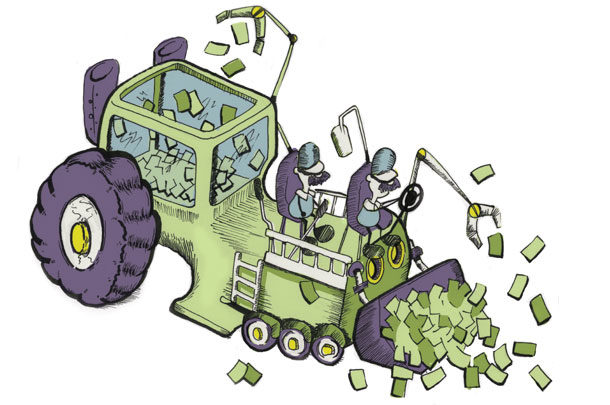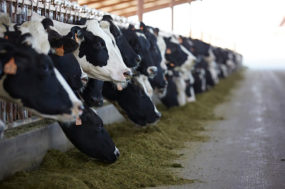Even a farm owned by a husband and wife is a co-ownership business. This article will help you keep your wealth engine running now and into the future.
Making decisions is the most challenging aspect of co-owning a business with another person. I’ve coached hundreds of people in their business transitions, and the most common cause of tension is related to making decisions.
When it comes to making decisions, people are so close to the complexities, they don’t know where to start.
Whether you’re thinking of transferring decision-making authority to someone in the family or you’re getting ready to sell the business or you’re thinking of becoming the owner in a business (maybe your parents’ farm), you need to know what happens to most people.
Most people hope their co-ownership will “work out.” The statistics show it usually works out poorly. It often looks like this: People stop talking to each other. They don’t know what’s causing the tension in their business.
Everybody gets frustrated. Most people aren’t experts at sharing authority, and they don’t want to be. What happens if you just do nothing, if you just keep making decisions the way you’re currently doing it?
Things get worse, your family breaks apart, you’re forced to sell the farm and, when people ask, you mutter something about your “bad knees.”
I have an answer that works. Here’s the story: Over the years, I’ve guided hundreds of business people in the transfer of decision-making. I’ve had hundreds of people tell me about the tension in their business.
Two of the biggest challenges are relational complexity and financial complexity. A successful decision-making process will help your business to succeed and will help you to have satisfying relationships with the people who matter most to you.
Here’s the opportunity for you: Imagine having business meetings without meltdowns or the “silent treatment.” Imagine a business environment where you’re not constantly managing other people’s behaviour.
Imagine a day off with someone special in your life without having to “put out fires” in the business. You’ve probably known for a long time poor decision-making creates tension and misunderstandings. Just think back over the last few years and consider whether you’re delighted with the decisions your co-owners have made.
You have a choice to make. Because here’s the thing: Real life throws dysfunction at you all the time. Successful decision-making doesn’t just happen.
And it’s no wonder. Just look at all the complexities in dairy farming: the people, the emotions, the money, the cows – usually the cows are the smallest challenge.
The power of having a process to make good decisions is incredible. The following five steps will help to keep your wealth engine running with co-owners in your business:
1. Identify the goals of each co-owner in the three main buckets of life: family/personal, ownership and management
Every person finds it effortless to prioritize one of the buckets shown above. People rarely agree on what bucket to prioritize and the decisions that should be made.
In order to experience harmony and success, it is essential to understand the co-owners’ desirable future possibilities. Only then can everyone feel understood and agree on the No. 1 most important business goal.
2. Agree on the No. 1 most important business goal
If you have too many goals, you won’t accomplish any of them. If you and the other co-owners can’t agree on the No. 1 most important business goal, then you will constantly have disagreements (many of them unspoken) about the decisions being made on the farm.
3. Identify obstacles and strategies to overcome them
Your personal life, your ownership of the business and the management of the business all compete for your attention at the same time. This isn’t right or wrong; it’s just true. You can’t be giving an injection and be fixing the baler at the same time.
When you and your co-owners agree on a strategy, make sure you identify which person will have the responsibility and authority to take the necessary action. You can have satisfaction and fulfillment in all the important aspects of your life. But it takes work.
4. Document authority, responsibility and accountability
This is the most important and most difficult of these five steps. Authority is the hardest aspect to figure out. Most people are half-clear about their job description or what they are expected to do.
However, most people have extremely low clarity on their authority – on the decisions they can make without having to check with anybody. I often hear farm families say they make decisions together. I never believe that.
What they usually mean is: The person with the loudest voice, or the person with a gift for using the “silent treatment,” is the one who ends up making the decision.
Write down on a single sheet of paper the decisions you know you can make without checking with anybody; that’s your authority. Write down the things you are responsible for or the stuff you have to do.
Then write down how the business will hold you accountable for the commitments you’ve made.
5. Identify and monitor key predictive indicators and create a rhythm of weekly accountability
If you don’t have a rhythm of accountability, then there is unspoken tension between the co-owners. Accountability gives freedom to the co-owners to exercise their authority without other people butting in to give their advice.
A rhythm of weekly accountability focused on key predictive indicators will make it easier for you to keep your wealth engine running.
What would it cost you if the poor decisions and tension just continued?
Whether you’re thinking of transferring some decision-making authority to someone in the family, or you’re getting ready to sell the business, or you’re thinking of becoming the owner in a business, you can use these five steps to have a satisfying and fulfilling environment in your business.
Any business can make better decisions by using these five steps because they turn financial and relational tension into harmony and success. ![]()
ILLUSTRATION: Illustration by Corey Lewis.
Ian Cubitt is a business transition coach. He is leading a free video workshop in September about “Avoiding Co-Owner Disaster.” Go to Ian Cubitt to access the free workshop.

-
Ian Cubitt
- Business Transition Coach/Accountant
- Mount Forest, Ontario
- Email Ian Cubitt









